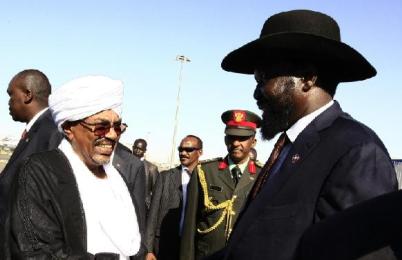South Sudan president seeks bilateral meeting with Bashir
April 8, 2015 (JUBA/KHARTOUM) – South Sudanese president Salva Kiir is seeking a face to face meeting with his Sudanese counterpart, Omer Hassan al Bashir, his office said on Wednesday.

The source disclosed that a meeting was planned to have taken place last week, but Sudanese officials reportedly said Bashir was “overscheduled” with being on the campaign trail but noted that Kiir’s request was accepted without specifying a date.
South Sudanese officials would likely use the planned meeting as an opportunity to explore the possibility that Sudanese authorities would agree to temporarily freeze the transitional financial arrangement and reduce oil transit fees in light of the dramatic drop in global crude prices.
Khartoum, on the other hand, would almost surely ask Juba to sever ties with insurgents it claims are hosted by South Sudan who use the country as a conduit for weapons they acquire from other countries to fight Sudanese armed forces in Darfur Blue Nile and South Kordofan.
Kiir, who met yesterday with the Sudanese ambassador to Juba, Mutrif Sidiq, on the occasion of the end of his term underscored his absolute trust in Bashir and his first deputy, Bakri Hassan Salih.
“Were it not for the president’s [Bashir] courage, there would not have been a state named the republic of South Sudan,” Kiir is quoted as saying in a statement from Sudan’s foreign ministry.
Kiir also expressed satisfaction with Bashir’s stances towards the crisis in South Sudan and the role he played as a “brother and a friend”.
Kiir emphasised that intimate ties between his country and Sudan are inevitable, describing differences between the two countries on border issues and accusations of mutual support for rebel groups as “temporary and insignificant”.
He added those difference could easily be overcome if there is political will.
(ST)
